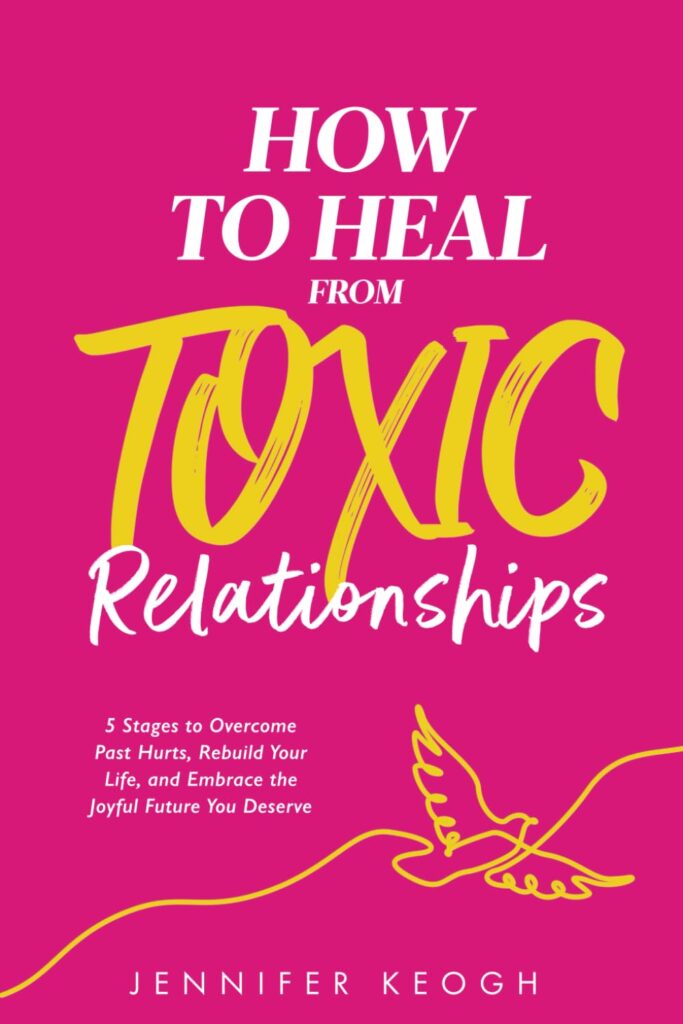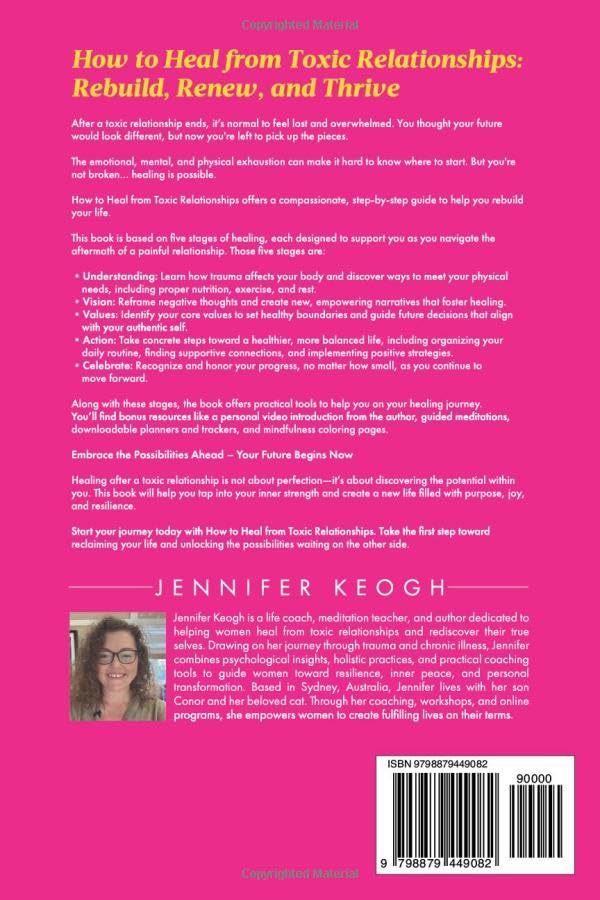When you’ve been in a relationship with a narcissist, it’s easy to feel like your sense of self has been shattered. Narcissistic abuse doesn’t just damage your emotional well-being; it chips away at your confidence, your sense of worth, and often leaves you questioning your own reality. Rebuilding confidence after such an experience is a crucial step toward healing, but it can feel like an uphill battle. The scars are deep, and the journey is long, but I promise you, you are not broken—healing is possible.
In this article, I’ll share practical confidence-building exercises that helped me and countless others rebuild a sense of self after narcissistic abuse. These exercises are designed to help you reconnect with your inner strength, rediscover your self-worth, and step into a future where you not only survive—but thrive.
If you’re looking for more guidance on healing after a toxic relationship, I invite you to check out my book How to Heal from Toxic Relationships (available on Amazon), which includes tools, guided meditations, and much more to help you navigate this healing process. But for now, let’s dive into the exercises that can start transforming your confidence today.
Understanding the Impact of Narcissistic Abuse on Confidence

Before we dive into the exercises, it’s important to understand why narcissistic abuse has such a profound impact on your confidence. Narcissistic abuse isn’t just about manipulation or emotional control—it’s about systematic attempts to undermine your sense of self.
The narcissist’s goal is often to make you feel small, unworthy, or incapable. They gaslight you, confuse your reality, and constantly criticize your decisions, appearance, and actions. Over time, this constant devaluation can erode your self-esteem until you no longer recognize the person you once were.
You may feel like you’ve lost yourself, like your confidence has evaporated. You might even wonder if you’ll ever feel good about yourself again. I want to assure you that these feelings are temporary and part of the healing process. Narcissistic abuse takes a toll on your emotional, mental, and physical health, but rebuilding your confidence is not only possible—it’s necessary for your recovery.
The Healing Process: What Confidence-Building Means for Survivors
Rebuilding confidence after narcissistic abuse is about more than just “feeling good about yourself.” It’s about rediscovering who you are, separate from the narcissist’s influence. It’s about re-establishing your own identity, setting healthy boundaries, and believing that you are worthy of love, respect, and happiness.
For me, the journey of confidence-building began with acknowledging that my feelings were valid. I had to understand that my experiences were real and that I deserved to heal. Confidence-building, in this context, isn’t about perfection—it’s about embracing your vulnerability, accepting your flaws, and choosing to love yourself despite everything you’ve been through.
In my book How to Heal from Toxic Relationships, I outline the five stages of healing, which form a roadmap to rebuild not only your life but also your confidence. If you’re looking for a deeper dive into these concepts, the book goes into each stage with practical tips, journaling exercises, and resources that can help you on your journey.
I’m also excited to share that I will soon be releasing How to Heal Your Inner Child and How to Heal Your Shadow Self, two new books that will further support your emotional healing. Each of these books will dive deeper into the root causes of low self-worth and provide tools to reclaim your inner power.
Confidence-Building Exercises for Survivors of Narcissistic Abuse
Now that we understand why rebuilding confidence is essential let’s dive into the specific exercises that helped me and can help you on your journey to rediscovering your self-worth.
Daily Affirmations to Combat Negative Self-Talk
One of the most insidious effects of narcissistic abuse is the negative self-talk it breeds. You’ve been told you’re not good enough, not smart enough, not worthy enough—and these lies can play on a loop in your mind. It’s crucial to counter these harmful thoughts with positive affirmations.
What are affirmations? Affirmations are positive statements that you say to yourself to challenge and overcome negative thoughts or self-doubt. They may feel awkward at first, especially if you’ve spent years telling yourself you’re not good enough, but the more you practice them, the more they will transform your mindset.
Example Affirmations:
- “I am worthy of love and respect.”
- “I am enough just as I am.”
- “I am strong, resilient, and capable of overcoming anything.”
- “I trust my instincts and my decisions.”
- “I am deserving of happiness and peace.”
Every morning, stand in front of a mirror, take a deep breath, and say these affirmations out loud. Do this even if you don’t believe them yet. The goal is to rewire your brain and begin to reclaim your worth, one affirmation at a time.
Journaling for Self-Reflection and Growth
Journaling has been one of the most powerful tools in my healing process. It provides an opportunity to explore your feelings, reflect on your experiences, and track your progress. Narcissistic abuse often leaves you feeling confused and uncertain, so journaling can help you make sense of your emotions and validate your experiences.
Journaling Prompts for Confidence Building:
- “What are three qualities I admire in myself?”
- “Describe a recent situation where I stood up for myself.”
- “How did I feel when I set a healthy boundary?”
- “What is one thing I’ve learned about myself in the last week?”
- “What do I want my life to look like in six months?”
Take time every day to write your thoughts down. Even if it’s just a few sentences, expressing yourself on paper helps you regain control of your narrative. Over time, you’ll see just how much you’ve grown and healed.
In my book How to Heal from Toxic Relationships, I include guided journaling exercises to help you process your emotions and stay focused on your healing path. And in my upcoming book How to Heal Your Inner Child, you’ll find journaling prompts that specifically address healing the emotional wounds from your past, which often play a significant role in building or damaging your self-confidence.
Setting Small, Achievable Goals
When you’re recovering from narcissistic abuse, it can be overwhelming to think about the big picture. You may feel like you’ll never be able to trust anyone again, or that you’re too damaged to move forward. But healing is a journey, and the first step is to set small, achievable goals.
Start with simple things, like taking a walk every day or having a conversation with a friend. These small wins will remind you that you have control over your life and that you are capable of achieving more than you think.
Examples of Small Goals:
- Call a supportive friend or family member once a week.
- Start a new hobby or revisit an old passion.
- Practice saying “no” to things that drain your energy.
- Dedicate 10 minutes a day to self-care, whether it’s meditating, reading, or taking a bath.
As you achieve these small goals, your confidence will naturally grow. You’ll start to see that you’re not just surviving—you’re thriving.
Mindfulness and Meditation to Reconnect with Yourself
Narcissistic abuse often leaves you feeling disconnected from your body and emotions. Mindfulness and meditation are two powerful practices that can help you reconnect with yourself and your feelings.
Mindfulness allows you to stay present and focused on the here and now, rather than getting lost in past trauma or future worries. Meditation, on the other hand, helps to clear your mind and cultivate a sense of peace.
Start with simple breathing exercises: sit quietly, close your eyes, and take deep, slow breaths. Focus on the sensation of the air entering and leaving your lungs. This helps center you and calm your mind, reducing anxiety and promoting self-compassion.
Beginner Meditation Exercise:
- Find a quiet space and sit comfortably.
- Close your eyes and take five deep breaths.
- As you inhale, count to four; as you exhale, count to four.
- Focus your attention on your breath and gently bring your mind back when it starts to wander.
Meditation can be a powerful tool for building confidence because it helps you become more aware of your emotions and empowers you to process them in a healthy way.
Practicing Self-Care and Prioritizing Health
Healing from narcissistic abuse requires you to put yourself first. After all, you’ve spent so long putting someone else’s needs before your own. Now, it’s time to focus on your well-being. Self-care is a vital component of rebuilding your confidence.
Start with the basics: hydrate, eat nourishing foods, get enough sleep, and move your body. It’s easy to neglect your physical health when you’re emotionally drained, but taking care of your body is a key part of the healing process.
Self-Care Checklist:
- Drink plenty of water to stay hydrated.
- Eat balanced, nutritious meals.
- Get at least 7–8 hours of sleep per night.
- Exercise regularly, even if it’s just a walk around the block.
- Schedule “me-time” each day for relaxation or pursuing a hobby.
As you prioritize your physical health, you’ll also begin to nurture your emotional health. This will ultimately help you feel more confident and capable in your daily life.
Reframing Your Inner Narrative
One of the most powerful tools in rebuilding confidence is reframing your inner narrative. Narcissistic abuse has likely left you with a distorted view of yourself. You may have internalized the narcissist’s criticism, leading you to believe that you are unworthy, unlovable, or incapable.
Reframing is the process of changing the way you think about yourself and your past. It’s about challenging those negative thoughts and replacing them with empowering beliefs.
Exercise:
- The next time you think, “I’m not good enough,” pause and ask yourself, “Is this the truth?”
- Replace the negative thought with a positive affirmation: “I am worthy of love and respect,” or “I have the strength to overcome anything.”
This exercise helps you regain control over your thoughts and shift from a victim mindset to a survivor mindset.
Joining Supportive Communities for Empowerment
Healing doesn’t have to be a solitary journey. There are countless support groups, both online and in person, where survivors of narcissistic abuse come together to share their stories, offer support, and empower one another.
I’ve found that connecting with others who understand your pain can help you feel less isolated. These groups offer a sense of community and belonging, and they can be a source of inspiration as you work on rebuilding your confidence.
Celebrating Small Wins and Progress
Healing from narcissistic abuse is a marathon, not a sprint. But every step you take, no matter how small, is worth celebrating. As you work through these exercises and begin to rebuild your confidence, take time to acknowledge your progress.
Example:
- After setting and achieving a small goal, celebrate by treating yourself to something that makes you happy, like a relaxing bath or a favorite meal.
- Keep a journal or a progress tracker where you can look back and see how far you’ve come.
Celebrate your growth, no matter how small the victory may seem. Each step forward is a testament to your strength.
Conclusion: Embrace Your Journey of Healing and Empowerment
Rebuilding your confidence after narcissistic abuse is not about perfection; it’s about progress. It’s about embracing your strength, accepting your past, and stepping into a future where you know your worth.
Remember that healing takes time. Be patient with yourself and keep practicing these exercises. With each affirmation, each journal entry, and each small victory, you are rebuilding the person you were always meant to be.
If you’re ready to dive deeper into your healing journey, I encourage you to pick up a copy of my book How to Heal from Toxic Relationships. It’s packed with practical tools, journaling exercises, and resources that will help you move through the stages of healing and rebuild your confidence for good.
In addition, keep an eye out for my upcoming books How to Heal Your Inner Child and How to Heal Your Shadow Self, which will offer more targeted healing strategies for addressing the emotional wounds that impact your self-worth.

